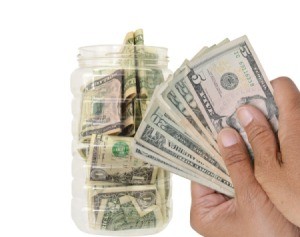This page contains the following Savings Tips.
I recently read in a magazine a plan to get your finances back in line and to save money at the same time. It is called the 50, 30, 20 plan.
The 50 part is 50% of your pay goes towards things you absolutely need such as food, medicine and electricity. The 30 is 30% of your pay goes towards things you want like a cell phone, cable television, and internet usage. The 20 is 20% of your pay goes towards savings.
I have begun to limit using what money we have left over from the "have to have" list and the "want list". I have started banking the 20% in my savings account. It is really easier than you think. Neither my husband nor I are paid an exorbitant amount each month, but we do spend money on things we do not need. Since the checks come in at different times, I have found it is easier to take the 20% off the top before I pay the bills. If push came to shove, I could always go into the savings account and take the money out.
There are many good aspects to this plan. It opens your eyes to see what you are really spending your money on and what you really do not need to spend your money on. Also the added benefit of having some savings really does make you rest a little more comfortable. After paying all the bills this month, I actually had money left over which is very unusual. I am looking forward to honestly see what I can delete in my billing and not really miss the loss. I have found it very useful and I hope you do as well. A little nest egg really can make a big difference.
By gem from VA
I was taught the 10% rule and still do this to this day! No matter how much you make a week or bi-weekly, always put 10% of it in your savings account, "out of sight, out of mind". You will be surprised how much you can save and in such a short period of time.
I always keep a log of everything we spend and I always round up the total. For example: if I spent $1.25, I always round it up to $2.00. It sounds small, but after awhile, it really adds up. I never have too worry about being overdrawn.
Source: Dave Ramsey's Talk show
By Vickie Simpson from Norfolk, VA

By Janna
By Diane Foster
By Linda
By Toni K.
By Doggy
By badwater
By LRP
By Cheryl from Missouri
By Mary
Jess
By marieaa65
By badwater
We also put ourselves on a tight budget. Any cash left over from the previous payday goes into my jug! You wouldn't believe how fast you can save.
Good Luck!
By Katie
Also, if you have a specific questions about saving money or starting a budget, submit it here:
My health has been getting worse for years. Not only have we lost my income, but the medical bills are through the ceiling. We spent everything that we had saved for our retirement, and were flat broke. To my husband's credit, he has never held it against me. He has stood by me through thick and thin.
I asked the Lord if He would support us if I put everything "extra" into savings. That would be rebates, pennies found on the street, aluminum cans, gifts, whatever. It turns out that there are a hundred ways to save a few cents or a few dollars.
For whatever reason, and I'll bet you know what I think, the money just started adding up. I exhibited homemade things in the fair, used coupons, cooked from my husband's garden, and did whatever I could to scrape up a dollar.
By the end of the year, we had accumulated $2,000. Since our normal annual income is around $9,000, that was a significant amount.
Of course, at the end of the year I fell and shattered my ankle, and that used up most of the savings. But I'm doing it again, and we're up to $1300 already this year.
To me, this just shows how easy it is to waste money. In the past, we had not had money left over. That year didn't have any miracle windfalls in it. We just didn't spend it when it came in.
I'm working on my fair projects today!
Coreen from Rupert, ID
Do you have a frugal story to share with the ThriftyFun community? Submit your essay here: http://www.thriftyfun.com/post_myfrugallife.ldml
Savings Bonds are now paying over 3% for the next few months. The only catch, they change interest rates every May and Nov. and you must hold them 5 years or pay 3 months of interest.
By Jon from Reedsburg, WI
For years, we have had a leaky roof. Every summer my husband puts another coat of sealer on it (it's a mobile home) and every winter we put buckets under the leaks. I have determined that we will have a good roof before the snow flies! We have been saving with the "windfall" method.
I bought a heifer 18 months ago. By September she will be ready to calve, and we will hopefully sell her for about $1500. We are also selling our food concession.
Today I received a gift card to Walmart, earned on a website that has me look at ads and take surveys. It's for $50. I could just spend it on fun stuff, but this time I will use it on my grocery bill. Then I will take the $50 from my grocery money envelope and put it into savings.
Last week there was a great sale at Albertson's. Buy 5 Oscar Mayer products and get $4.00 back. The regularly $2.99 packages were marked $1.00 or 10 for $10.00. I bought twenty packages, five at a time. I spent $21.20, but I got back $16.00 to use on next orders. Naturally, I used my $4.00 off on the second order of $5.00. Ditto for the third and fourth orders. There was no limit. Our freezer has a good supply of deli ham for sandwiches and casseroles. I put my grocery money in an envelope. When I run out of money, I quit. BUT if I have some left over, I put it in savings for our new roof.
With opportunities like this, there will be money for savings. Two friends in construction have offered to give us bids and possibly trade their labor for our food concession. There are lots of possibilities. If we get our new roof this year, next year we hope to add solar panels. Wahoo!
By Coreen Hart
If you have money in an ordinary statement or passbook savings account, you are probably getting about 3% less then if you put in CD's (certificate of deposits). CD's range from 6 month to years so get one that fits your needs and you'll be making more money each month in interest.
Our bank offers a "Keep the Change" program. A painless way to save $. Every time you use your debit card, the bank rounds it up to the next higher dollar. Works great, and it goes directly into your savings account.
By eileen from Northern, CA
Always put money aside out of your paycheck away in a separate account to save for rainy days. Even the poorest of people can afford 5% especially if they do that from their first paycheck. I recommend 10%, but for someone making $200 a week, $20 is a lot of money. $10 is more doable in those situations.
By Becky from Essex, MD
Before I retired, I used to use what was called a "Bohemian" savings plan. Why Bohemian, I don't know. It involved, if you get paid on a Friday, for instance, you would put your check in the bank or enter the deposit in your checkbook on Saturday the first week. You would do this on Sunday the second week, and so on. By the time you get to Friday again, you have 2 paychecks. Easy to do too!
Source: A Chicago newspaper about 45 years ago.
By Shrink from Redlands, CA
Make saving a fixed part of your budget. Determine a reasonable amount of money each month and have it automatically deposited into a savings account. Deposit the money into a federally insured online savings account and you can earn as much as 5% on your money.
Today is pay day and it's time to dole out the allowances. Remember those youthful days of the weekly allowance? Whoever said you can't be young again? Today on allowance day I have two envelopes - one for me and one for my husband.
It started when we balanced the checkbook one month and noticed how many withdrawals were made with our debit cards. With the convenience of debit cards comes their nomenclature - debit. It's easy to produce the card when the mood strikes, and it's dangerous. Not only does it make balancing a checkbook more of a task, but it allows instant access to your cash - all of it. By doing the math my husband and I realized that each of us was spending nearly $200 a month on unessential items.
Self restraint is difficult. Instead of relying upon the debit card, we allotted a weekly allowance to ourselves. Each week I would make a trip to the bank and withdraw exactly how much we needed. Bills still came out of the checkbook, as did groceries and other necessary purchases such as gas. Like the allowances of our youth, our adult ones were to be used for non-essential items.
Initially, we kept the budget tight. We budgeted our weekly needs and allowed only a small portion of money for spending. Then, on top of that we added $10 to the total. That $10 was our weekly allowance. Anything that didn't qualify as a necessity was to be paid for using the $10, and neither one of us could comment on how the other spent his/her money.
The first week was rough. Since our allowances were so small, it forced us to save two weeks for something we really wanted. Although I tried to argue that the collectable for sale on eBay was a necessity because I may never see it again, my husband didn't cave nor did he "advance" me next week's funds. If it sold for $10, I could buy it; anything over that amount was off limits.
Although a few of our friends worried that we were in financial crisis, the allowances put a new value on items. Was I heartbroken that I hadn't purchased that collectible for sale? Not at all. In fact, I learned that if I saved part of my allowance each week I had a large amount of "fun money" by the end of the month. It got to the point where I could look in my wallet and actually see money in there.
In the end the allowance did its job. We realized how foolish we were with our money. Now, I'm not so strict with the allowance as I had been a few months ago because I don't see the kind of crazy spending I sawbefore we tried it. Our mothers and fathers knew this years ago: allowances teach responsibility.
You can save a lot of money if you recently paid off a vehicle. Put the money you would have paid for the car payment in a savings account every month. If you've spent a couple years making the payment anyway, a couple more can't hurt. And you'd be surprised at how quickly it adds up!
By Sarah
Editor's Note: You also can reduce your car insurance coverage and save quite a bit of money.
I recently realized I need to save the pre tax savings on our medical savings account. They do an auto deduction every two weeks out of my husband's check which is $40 , which is about 9.20 savings for his check. I will start saving this on his first check of the new year on the 13th, from here on out.
Also, I plan on saving the medical money as it is used (like getting prescriptions filled) and will save that in a special account. At the end of the year, we will have $1,040 in that new account. Whenever we are out shopping or dining out, I bank the discounts that we get. My Smartypig vacation account is 30% funded now for the trip next summer because of all my found savings.
I've never been a saver and am just now getting the hang of it at my ancient age, lol. My new mantra is "save what you saved or else you have dropped the ball". Good luck and happy saving.
By lori macDonaldfrom near Memphis
Don't spend your overtime money. Any and all extra money made should go into a separate account (savings account or investment). Saving your overtime money or extra earned money will add up very fast over the years! You will be amazed.
By Sharon
Every day that I don't buy a lottery ticket I put $2 in an envelope and do the same with coffee at work, where I used to buy one or two cups a day. At the end of the month I either put what I've accumulated into savings or against a debt I owe. It's easier to see the savings this way
By Michaelmac
Here are the Savings Tips asked by community members. Read on to see the answers provided by the ThriftyFun community.
We finally are to a point where we have budgetted well enough to have some money to put in savings. About 100 dollars a month. What would be a good long term investment? Thanks, Alice.
The first thing I did was to set-up an emergency fund. I created a 2nd savings account and called it my 'permanent' savings. I would have a certain amount direct deposited into this account and when it reached $500 I would put it into a 3-month CD. When I had enough money to open a 2nd CD I made sure it would not mature the same month as the one I already had opened. I did this until I had 3 3-month CD's that matured in different months. By setting my CD's up this way I knew that if I had an emergency I would have access to at least $500 every month. After I set up my 3-month CD's I started opening 6-month CD's. I did this until I had enough money to cover 6 months worth of bills. I know that CD's do not acquire very much interest these days. My 3-months are at 0.75%. But the money is tied up and I will pay a penalty if I take it out early and that is enough to keep my fingers off of it.
After I set-up my emergency fund I put the max allowed into my 104k. The remaining amount was split between my Roth IRA and my 'permanent' savings. If you are not comfortable putting that much into a 401k at least in put what your employer matches. It's free money for your retirement ' take it!
 A penny saved is a penny earned, but saving money is difficult for many people. This page features painless ways that you can start to increase your savings.
A penny saved is a penny earned, but saving money is difficult for many people. This page features painless ways that you can start to increase your savings.
 Saving money can be difficult. One thing that might work for you, if you get a raise, is to bank it, all of it. This way that extra money can grow and be used for future large purchases or unforeseen events.
Saving money can be difficult. One thing that might work for you, if you get a raise, is to bank it, all of it. This way that extra money can grow and be used for future large purchases or unforeseen events.
 When out shopping we are often tempted to buy something not on our list. This is a page about avoiding unnecessary purchases.
When out shopping we are often tempted to buy something not on our list. This is a page about avoiding unnecessary purchases.
 It can be amazing how quickly those extra coins can add up. This page is about saving spare change.
It can be amazing how quickly those extra coins can add up. This page is about saving spare change.